West Nile Virus (WNV) is a serious concern for horse owners, and recognizing its causes, symptoms, and preventive measures is key to ensuring your horse’s health. As a viral disease primarily transmitted by mosquitoes, WNV can lead to severe neurological issues in horses, often with life-threatening consequences if left untreated. Fortunately, with proper care and vaccinations, this disease can be prevented. Below, we’ll dive deeper into how horses contract West Nile Virus, what symptoms to watch for, and how Signature Equine Hospital helps protect your horse from this dangerous virus.
Causes of West Nile Virus in Horses
West Nile Virus is transmitted primarily by mosquitoes that become infected after biting birds carrying the virus. Horses are considered “dead-end hosts,” meaning they can’t transmit the virus to other horses or humans. However, the danger lies in the ability of mosquitoes to easily pass the virus to any horse that has not been adequately protected.
Environmental factors also play a role in a horse’s susceptibility to West Nile Virus. Horses in areas with standing water, such as ponds, lakes, or poorly drained fields, are more likely to be exposed to mosquitoes, and therefore, to the virus. Hot, humid weather further increases mosquito activity, making summer and early fall peak periods for potential infection.
Horses of all ages and breeds can contract West Nile Virus, though older horses or those with compromised immune systems may be at a greater risk of developing severe symptoms. Without timely intervention, WNV can cause irreversible damage to the nervous system and lead to long-term health complications.
Symptoms of West Nile Virus in Horses
One of the most challenging aspects of West Nile Virus in horses is the variety of symptoms it can present. Not all horses show the same signs, and some may exhibit only mild symptoms. However, because WNV affects the central nervous system, many horses will display neurological issues that are hard to ignore.
Common symptoms include:
- Weakness in the hind limbs or difficulty standing
- Muscle tremors, especially around the face or neck
- Loss of coordination or stumbling
- Fever
- Partial paralysis
- Head pressing or circling
- Sensitivity to touch or sound
- Difficulty swallowing
If your horse is displaying any of these symptoms, especially during mosquito season, it is crucial to seek veterinary care immediately. Early detection and prompt treatment can make all the difference in recovery.
Prevention and Treatment of West Nile Virus in Horses
Prevention is always the best strategy when it comes to West Nile Virus. One of the most effective preventive measures is regular vaccinations. At Signature Equine Hospital, we recommend bi-annual vaccination boosters for all horses. These vaccinations are vital, particularly for horses living in mosquito-prone areas. Keeping up with your horse’s vaccination schedule is one of the simplest and most reliable ways to protect them from this dangerous virus.
In addition to vaccinations, environmental control is key. Reduce standing water sources around your horse’s pasture and stable to minimize mosquito breeding areas. Using insect repellents and fly sheets can also offer some protection during mosquito-heavy months.
If your horse contracts West Nile Virus, treatment will focus on supportive care, as no specific antiviral treatment is available for WNV. Your equine hospital will work to manage symptoms, often using anti-inflammatory medications, IV fluids, and supportive therapies to aid in recovery. Horses with mild symptoms may recover fully, though it can take weeks or months. Unfortunately, horses with severe neurological damage may experience long-term effects or even fatality.
Keep Your Horse Protected with Signature Equine Hospital
West Nile Virus poses a real threat to horses, but with the right preventive measures, you can significantly reduce your horse’s risk of contracting this serious disease. Staying vigilant about mosquito control, observing your horse for any unusual symptoms, and scheduling regular vaccinations at your trusted horse hospital are all steps you can take to safeguard your horse’s health.
At Signature Equine Hospital, we are dedicated to providing comprehensive care for your horse, including preventive measures like bi-annual WNV vaccinations. Don’t wait until it’s too late—contact us today to ensure your horse is fully protected from West Nile Virus and other equine diseases. Your horse’s health and well-being are our top priority.
